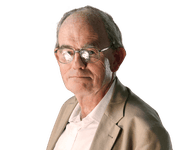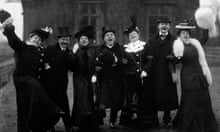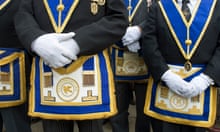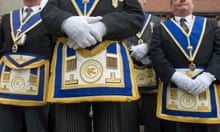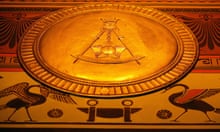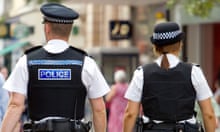The news that the freemasons, in an unprecedented bout of candour, have made available online the names of their entire membership up to 1923 will only fuel the paranoia that surrounds their present-day activities.
Diane Clements, director of the Library and Museum of Freemasonry, said: “The records demonstrate the extensive involvement which freemasons have had in British society.”
I’ll say. According to the documents, the masonic roll call included at least 5,500 police officers (many occupying senior positions), several thousand army officers – including the Duke of Wellington and Lord Kitchener – 170 judges, 169 MPs and 16 bishops. Not to mention senior members of the royal family, up to and including Edward VII.
Attention has focused on the inquiry into the sinking of the Titanic, widely regarded at the time as a whitewash. It now emerges that Lord Mersey, the judge who conducted the inquiry, was a mason; likewise two of his five expert assessors. In addition, the president of the Board of Trade, which got off remarkably lightly, was a mason; and so was Lord Pirrie, the chairman of Harland and Woolf, the company that built the Titanic, and a board member of the White Star shipping line that owned the ship. Whatever the truth of the matter, it doesn’t look good.
There has long been concern about the role of freemasonry in public life, particularly in the police and judiciary and in some local authorities, where they tend to graduate towards planning committees. In the police, until fairly recently, masons have tended to favour the elite squads.
Some years ago, when investigating miscarriages of justice, I began to wonder whether the wall of silence that greeted inquiries, official and unofficial, into allegations of police malpractice, had anything to do with the high incidence of masons in certain forces.
Sir Robert Mark, Metropolitan police commissioner in the 1970s (who famously remarked that he wanted to catch more criminals than he employed) certainly thought so. On his watch about 500 officers, including many masons, were sacked or forced to retire; several were jailed for corruption.
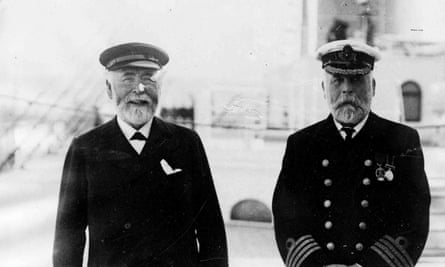
Sir Kenneth Newman, who became commissioner five years after Mark retired, published a code of ethics that included the following: “The discerning officer will consider it wise to forgo the prospect of pleasure and social advantage so as to enjoy the unreserved regard of those around him.” Far from complying, masons in the Met subsequently set up a Scotland Yard lodge, – the Manor of St James – which, if nothing else, suggests a certain self-confidence.
The late lord chief justice, Lord Widgery, who conducted the 1972 inquiry into the Bloody Sunday shootings in Northern Ireland, was a mason. Like the inquiry into the Titanic, it was widely regarded as a whitewash. I have no idea whether the fact that he was a mason had anything to do with the outcome, but as with the Titanic, it doesn’t look good.
The masons, of course, hotly deny that they are a secret society. They are, they say, a society with secrets: a distinction lost on those of us who are not masons. Nor does it do much for public confidence that they fight so tenaciously to protect the identity of their members. When I succeeded in persuading the last Labour government to require that applicants for the police, judiciary and planning inspectorate disclose membership of secret societies, they resisted vigorously, even threatening legal action and eventually forcing the government to back down.
The late Sir Gerald Vaughan, at the time the most senior freemason in the House of Commons, once remarked to me that “if I have any criticism of freemasonry” (and he didn’t have many), “it is very difficult to leave once you have joined”. And that, of course, is the point. You can be called upon to assist a brother at any time. You can lapse, but you can’t resign.
Since masonic membership is hard to prove, it is rare for masons to be caught out in skulduggery, but it does happen. Martin Short’s classic book Inside the Brotherhood contains many examples; and on a couple of occasions the local government ombudsman has upheld complaints of undue masonic influence on planning committees. In the 1990s Lancashire police authority had to make a £70,000 payment to two businessmen over claims they were stitched up by masonic officers.
To what extent is masonic influence in public life a problem today? The masons claim to have 250,000 members in England alone, and another 150,000 in Scotland and Ireland; but my guess is that, like much organised activity, freemasonry is in steep decline. Although masons are still influential in some professions, especially uniformed services, membership is far less fashionable than it used to be. Much unjustified paranoia surrounds freemasons, but their obsessive secrecy and the oaths they swear inevitably means that they have only themselves to blame.

